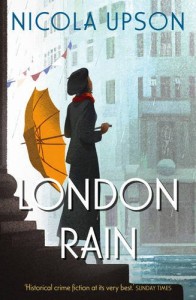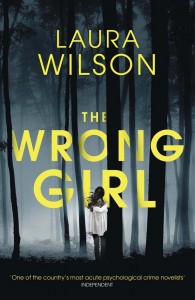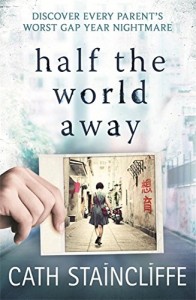 London Rain by Nicola Upson published by Faber & Faber
London Rain by Nicola Upson published by Faber & Faber
The Wrong Girl by Laura Wilson published by Quercus
Half the World Away by Cath Staincliffe published by Constable
Just as I have a prejudice against current writers taking on the characters and settings of their dead colleagues, so I have an instinctive dislike of crimewriters’ using real people to be their sleuths. Over the years we have had Mozart, Dante, and various princes, disentangling truth from lies in all sorts of novels and identifying murderers. When the historical character lived and died centuries ago I mind less, but when it comes to a woman such as Josephine Tey, who died far too young only in 1952, I do object.
The fact that Nicola Upson, who has created a series of novels with Tey as her detective, has plenty of sympathy for her character and is a good writer herself, makes me even more uncomfortable. I can’t help thinking that Tey, who was a private person living her life in strictly separated compartments, would be outraged to have someone else inventing ideas for her to think and emotions for her to feel. In a way Upson could argue that ‘Josephine Tey’ was a fictional construct in the first place, rather than a real person, because the woman behind that pseudonym was Elizabeth Mackintosh, who also wrote plays as Gordon Daviot. But Upson’s Tey writes the plays as Gordon Daviot too. I am almost certainly alone in this distaste because dozens of critics I respect seriously admire the series.
London Rain is an interesting novel in itself. Set during the coronation of George VI, it has Tey arriving at Broadcasting House, where the BBC is set to broadcast her play Queen of Scots. Tey encounters one of the few women allowed to progress beyond the lowliest of jobs. Vivienne Beresford is acting as stand-in editor of The Radio Times and is married to a star presenter, with an all-too public reputation as a womanizer. The revenge Vivienne takes on him, and the ramifications that surround it, provide an entertaining mystery.
On the way Upson offers fans of the real Josephine Tey’s novels many treats. She names characters after Tey’s; she plays with some of Tey’s major themes, such as concealed identity and the unforgiveable selfishness that lies behind most crimes; and she offers real and imaginary biographical snippets, as well as alluding to Tey’s own relationship with her fictional detective, Inspector Alan Grant of Scotland Yard. Upson’s research seems excellent, and she doesn’t make the mistake of attempting a pastiche of Tey’s style, but as I read I couldn’t help remembering a small scene from Tey’s Bratt Farrar. This is a novel about a young man claiming to be Patrick Ashby, who died in childhood and who would otherwise have inherited a small fortune on his twenty-first birthday. The pretender looks very like the rest of the family and shares many of their tastes and talents. His supposed sister tells her aunt that she likes him but that she has no sense of ever having met him before. This is rather how I feel reading Upson’s version of Josephine Tey. London Rain is thoroughly agreeable, but I don’t recognize the character from the way Tey wrote her own novels, and I would so much have preferred Upson’s if she had given  her heroine any other name.
her heroine any other name.
Flaws in the understanding of identity also crop up in Laura Wilson’s The Wrong Girl. I had great pleasure in discovering that, unlike so many other crime novels published at the moment with ‘girl’ in the title, Wilson’s deals with a child. This is ten-year-old Molly Jackson, who is convinced that she is really Phoebe Piper, who went missing from a family holiday several years before and who has never been found. Molly could be forgiven for any strategy she invented to make sense of her tricky life, and she is an appealing and resourceful girl. When she disappears from the home she has been sharing with her single mother, Suzie, and her recently dead uncle Dan, she sets in motion a series of interventions that uncover decades-old secrets and painful truths.
Wilson has always been an acute observer of dysfunctional families, and she writes extremely well. This novel moves faster than some of her historicals and has the grip of a thriller. Once or twice it seems to edge uncomfortably close to a real case, but Molly is individual enough to stick in the memory for a long time.
 Cath Staincliffe is another writer with an acute understanding of families, the damage they do to each other and the protection they can provide. Here, in Half the World Away, she tackles the worst nightmare for any parent of a gap-year traveller. Lori Maddox has graduated and is travelling the world at a slightly older age than some, but that is no comfort to her mother when all communication ceases from her last-known address in Sichuan. Jo follows her there, with Lori’s father from whom she has been separated for years, to look for clues that might explain why their daughter has gone off-grid. What they discover is horrifying, but the final twist is worse. Staincliffe writes with a direct simplicity that increases the emotional impact of the terrible dilemmas she sets up for her characters. I would recommend this novel to anyone except the parents of young adults who are getting ready to cross the world before or after university – or at any other time.
Cath Staincliffe is another writer with an acute understanding of families, the damage they do to each other and the protection they can provide. Here, in Half the World Away, she tackles the worst nightmare for any parent of a gap-year traveller. Lori Maddox has graduated and is travelling the world at a slightly older age than some, but that is no comfort to her mother when all communication ceases from her last-known address in Sichuan. Jo follows her there, with Lori’s father from whom she has been separated for years, to look for clues that might explain why their daughter has gone off-grid. What they discover is horrifying, but the final twist is worse. Staincliffe writes with a direct simplicity that increases the emotional impact of the terrible dilemmas she sets up for her characters. I would recommend this novel to anyone except the parents of young adults who are getting ready to cross the world before or after university – or at any other time.
